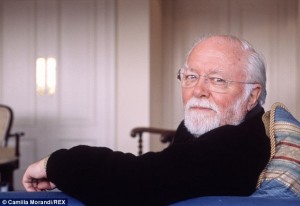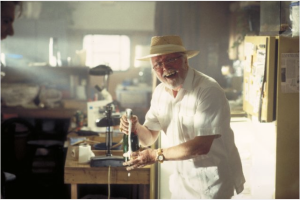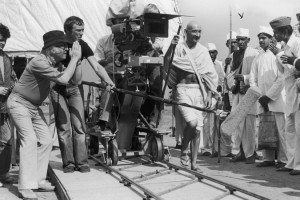 Truth be told, I had no idea who Richard Attenborough was until Gandhi became an international blockbuster in 1982. This, I’m embarrassed to admit, despite Attenborough having an established career as an acclaimed character actor long before then. Hell, I only realized after he became the Oscar-winning director of Gandhi that he also directed one of my favorite war movies, A Bridge Too Far (1977).
Truth be told, I had no idea who Richard Attenborough was until Gandhi became an international blockbuster in 1982. This, I’m embarrassed to admit, despite Attenborough having an established career as an acclaimed character actor long before then. Hell, I only realized after he became the Oscar-winning director of Gandhi that he also directed one of my favorite war movies, A Bridge Too Far (1977).
All the same, I read enough over the years to appreciate that Attenborough’s dedication to the motion picture arts and sciences was surpassed only by his dedication to charitable causes and social issues like childhood education:
He passionately believes in education, primarily education that does not judge upon color, race, creed or religion. His attachment to Waterford is his passion for non-racial education, which were the grounds on which Waterford Kamhlaba was founded. Waterford was one of his inspirations for directing Cry Freedom (1987), based on the life of Steve Biko.
(IMDb)
 I finally developed some appreciation for his character acting when I saw him play the grandfatherly paleontologist in Jurassic Park (1993).
I finally developed some appreciation for his character acting when I saw him play the grandfatherly paleontologist in Jurassic Park (1993).
But I felt moved to write this modest tribute based solely on my solidarity with the liberal politics of this “champagne socialist,” which compelled him to direct Gandhi and Cry Freedom.
It speaks volumes that Gandhi’s haul of eight Oscars set a record for British films. But even more telling is its juxtaposition with the biopic of the only man who could be fairly considered Mahatma Gandhi’s twentieth-century peer, Nelson Mandela.
After all, far from winning a comparable number of Oscars, Mandela: Long Walk to Freedom (2013) received only one back-handed nomination (for Best Original Song), and it did not even win that, losing out to the cartoonish song from Frozen.
This is not the place to delve too much into the reasons why Hollywood – after embracing Gandhi so abundantly – snubbed Mandela so niggardly. No doubt movie critics and political commentators alike would find just cause to cry racism.
 But it’s probably fair to assert that the primary reason had more to do with differences in cinematic skill and vision between the respective directors than with any difference in the heroic life story and liberation struggle each had to dramatize. Frankly, there’s probably no greater testament to Attenborough’s greatness as a director than the relative success of these two films.
But it’s probably fair to assert that the primary reason had more to do with differences in cinematic skill and vision between the respective directors than with any difference in the heroic life story and liberation struggle each had to dramatize. Frankly, there’s probably no greater testament to Attenborough’s greatness as a director than the relative success of these two films.
Even so, it’s arguable that his film Cry Freedom actually upstaged Mandela – weaving as it did the inspiring story of friendship between White journalist Donald Woods and Black anti-apartheid activist Steve Biko into a searing indictment of South Africa’s apartheid regime.
I should not venture any further, lest I become one of those creepy, opportunistic eulogizers who have far too much to say about people they knew so little about. Indeed, the irony in this case is that I know far more about Attenborough’s brother David, whose engaging whisper as presenter of natural history programs has educated and thrilled me for years.
Attenborough died on Sunday. He was 90.
Farewell, Lord Attenborough.